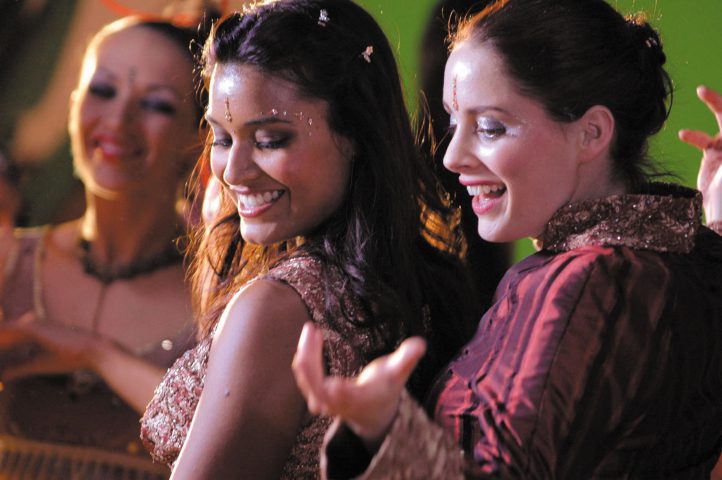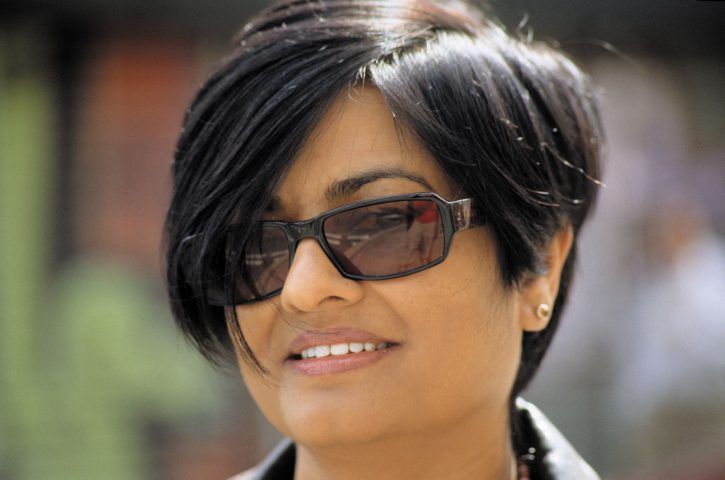“No matter what the recipe says, always follow your heart.” That’s the moral message of filmmaker Pratibha Parmar’s cinematic fable Nina’s Heavenly Delights. Delights is a sure crowd-pleaser—a sensual mix of spices, Bollywood and Scottish comedy, community, family and most of all, love.
After living in London, estranged from her Indian Scottish family for three years, Nina Shah returns home to Glasgow to bid goodbye to her recently deceased father. While there, Nina, who knows she’s into girls, realizes she’s not the only member of her family with a hidden passion. Her father’s secret gambling habit—resulting in mountains of debt—means her family has to sell his beloved and famed restaurant, The New Taj, to pay his debtors.
The story becomes complicated when Nina’s wish not to sell has her butting heads with the co-owner’s daughter, Lisa, whose father won half ownership in a bet. Nina and Lisa argue over the sale of the restaurant to a local rival, and to make matters worse, Nina hears that her father posthumously has a chance at becoming known as “the best bloody cook this side of Merry Hill” by winning the city’s Best of the West Curry Competition for the third time. Of course this means Nina has to do the cooking, in his absence.
Lisa’s hesitant, but Nina wins her over and enters the competition. With help in the kitchen from Bobbi, Nina’s best friend and self-proclaimed “chutney queen,” and from the reluctant Lisa, Nina’s ready to face her competition. Despite the fact that Lisa’s dating Nina’s brother, both women quickly find they are falling for each other.
Director Parmar is known for such hard-hitting documentaries as Sari Red and Warrior Marks, on which she collaborated with renowned American author Alice Walker, Nina’s Heavenly Delights, is her first mainstream commercial film. Parmar gleaned from her own imagination, but the film is also partly inspired by true events: the way Parmar fell in love with her partner, Shahin, an architect, over fifteen years ago. “I really wanted to tell that story as fictionalized story, but use a bit of comedy. For me as a filmmaker, [making Nina’s Heavenly Delights was about] really stretching myself creatively, and trying to tell stories a different way, using different genres. I love working with actors, so it’s been great.”
Lead actresses Shelley Conn and Laura Fraser sizzle with chemistry as Nina and Lisa. “I wanted a really sexy couple, and they were great. I was the one who was nervous about their first kiss scene. [But] they were into kissing and snogging
on screen.”
She decided to set the film in Scotland as opposed to England, where she and Shahin live, out of a desire to showcase the wide spectrum of communities within the South Asian diaspora. Parmar came across Glasgow’s South Asian community while working on a documentary. “I’d gone to an Indian restaurant, all the waiters were wearing kilts and had Scottish accents. A lot of people when they see the film say, ‘We didn’t know there were Scottish Asians.'”
It was an experience the world-traveler never forgot. Born in Nairobi Kenya, Parmar’s family immigrated to England in 1967. After college she performed volunteer work in India, spending three months in Calcutta working with Mother Theresa. It was while working as a community social worker with young women using photography, that Parmar discovered the power of the visual medium. “It was quite a natural transition. Both [my volunteerism and film work] are about working with South Asian identity. My personal experiences have always informed what I do.” Through documentaries like Khush, about the lives of gays and lesbians living in North America, the UK, and India, and A Place of Rage, about the contributions of black women to the civil rights and black power movements, Parmar has gone on to tell truthful stories about women and people of color that left up to mainstream media, might have gone ignored. “The access to visual culture is so mass. I think that as LGBT people, and people of color, we need to make use of this medium, to make ourselves visible, and on our terms, create for ourselves. My fundamental aim is I want to seize this power of mass communication…so that the world is not being viewed through only the white heterosexual male perspective.”
Parmar discovered feminism, and her sexuality, while studying at university. “Like Nina, in the film, I lived very much a double life. I had this whole other thing going on, which my family knew nothing about for many years.” Unlike young South Asians today, who can take advantage of resources to aid them in coming out, in Parmar’s time, “It was a far more difficult process.”
Parmar’s next project continues her collaboration with Alice Walker, in the form of a documentary about the Pulitzer Prize-winner’s life and career. Parmar and Walker were introduced by late poet and writer June Jordan while Parmar was making A Place of Rage. Walker suggested they make a documentary on female genital mutilation. What both expected to be a small project turned into what Parmar said is one of the hardest films she’s made. Warrior Marks went on to win the Audience Award at the 3rd Women’s Film Festival in Paris and the Public Prize at the 11th International Film Festival in Madrid in 1994. “That experience really brought us together. We are very much of the same mind, politically in what we want to do, and we have a lot of mutual respect for each other. Our friendship has deepened over the years.”
Moving on to Nina’s Heavenly Delights was difficult for Parmar because of the age-old struggle directors must overcome to get their films made. It took six years to bring Delights to the screen. “I was naïve, I didn’t realize how difficult it would be to get a lesbian curry romance off the ground,” says Parmar. Finding funding took up the bulk of her time. “Not only was it a queer film, but it was also South Asian. Not only was it South Asian, but it was also Scottish. One major financier said to me, ‘lesbians have had their sell by date.'” Parmar thinks if the film’s protagonist had been “a hijab wearing, wrist slashing lesbian,” she might have actually had a smoother time funding the picture. “But she’s a confident, sexy woman who falls in love with a woman. Yes, she has her angst about it, but in the end, she follows her heart.”
If, after seeing Delights, you aren’t in the mood for Chicken Shakuti, you’re missing one of your senses. After playing the festival circuit all summer, the film is scheduled to be released in the U.S. this winter. More information and a recipe for Chicken Shakuti can be found at ninasheavenlydelights-themovie.com.



What Do You Think?